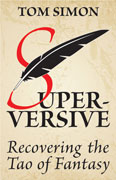#11 in the series, following ‘Campbell’s Cream of Fantasy’. This is the last piece in the series as originally written; an earlier version appeared on LiveJournal in June, 2006.
The process that replaces winged Pegasus with plodding Dobbin, and Tolkien’s ‘Soup’ of myth and legend with ‘Campbell’s Cream of Fantasy’, does not stop with debasing settings and motifs. It debases themes as well. The old folktales, among many other things, were wisdom literature, a thing that does not exist in any thoroughly modern society. We have a number of authors nowadays who want to create a substitute for wisdom literature; what they actually do is write books with titles like ‘The Rules of X’ or ‘Chicken Soup for the Y’. Not having much in the way of wisdom themselves, they substitute pop psychology and bumper-sticker slogans.
This is bad enough in the modern world; it is doubly bad in fantasy, for it is false to the whole atmosphere of Faërie. [Read more…]










Recent Comments